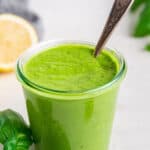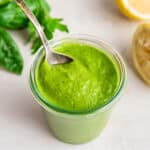This Green Goddess Salad Dressing is a vegan spin on the classic recipe! No mayo here—instead, ripe avocado is blended with lemon juice for a bright, creamy, herbaceous salad dressing to perk up greens, meal bowls, and more.
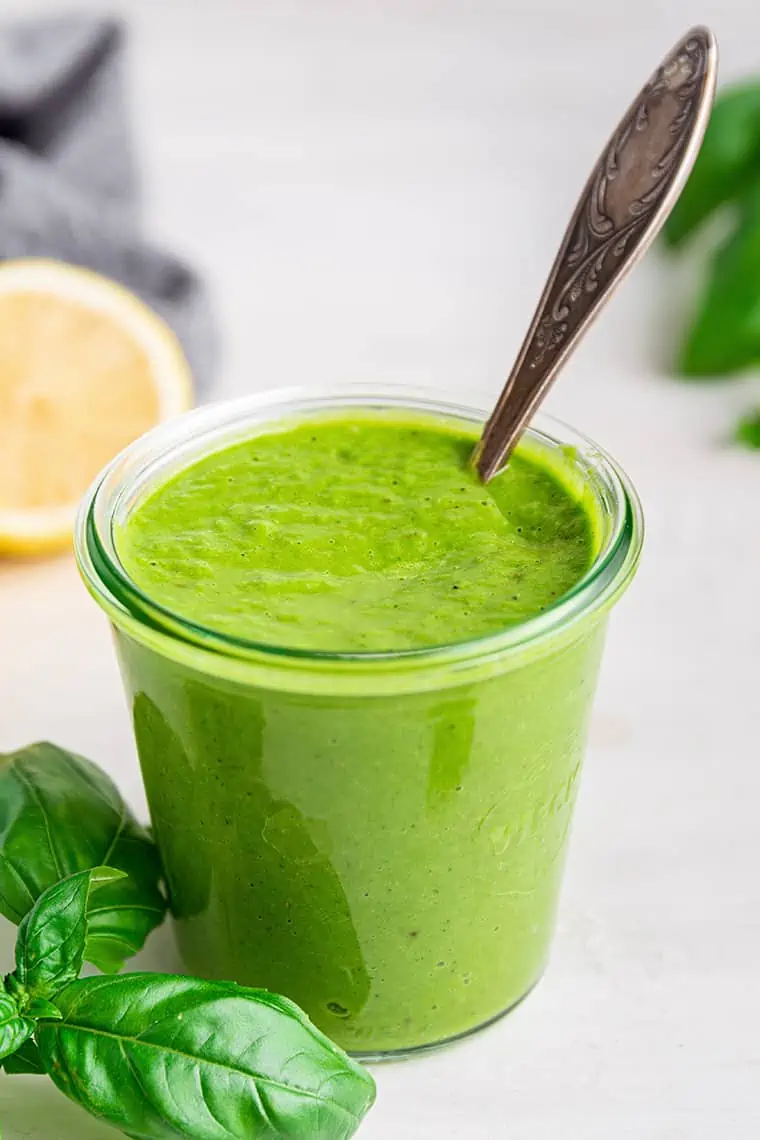
Green goddess salad dressing has an aura of healthiness to it. I mean, it’s green, right?! But the original green goddess recipe is made with mayonnaise and sour cream—not exactly healthy foods. (Womp womp.) And the briny flavor? Well, that comes from anchovies, so if you’re vegan or vegetarian, traditional green goddess dressing is a no-go.
Luckily, it’s easy to make a plant-based, healthy green goddess dressing. The star of the show, after all, is the herbs, and they’re definitely vegan!
Why You'll Love Green Goddess Salad Dressing
- Ultra creamy (without the mayo). For creaminess, I thought about using vegan sour cream or making a cashew cream based dressing, but in the end, I turned to one of my perennial favorites, the avocado. Not only does this make for a creamy texture, it also amps up the green factor!
- No anchovies. As noted above, that typical briny flavor in green goddess dressing comes from anchovies…except for in this recipe! I used capers. They bring some of the same flavors to the table, but they’re a bit tart and almost lemony, too. They really add that little je ne sais quoi to this vegan green goddess dressing.
- Super easy. To make this dressing, all you need to do is blend the ingredients together. It doesn't get much easier than that!
- Bursting with fresh herbs. One of my favorite things about green goddess in general is that it's made with so many fresh herbs. This recipe is loaded up with mixed soft herbs, tarragon, and chives. So good!
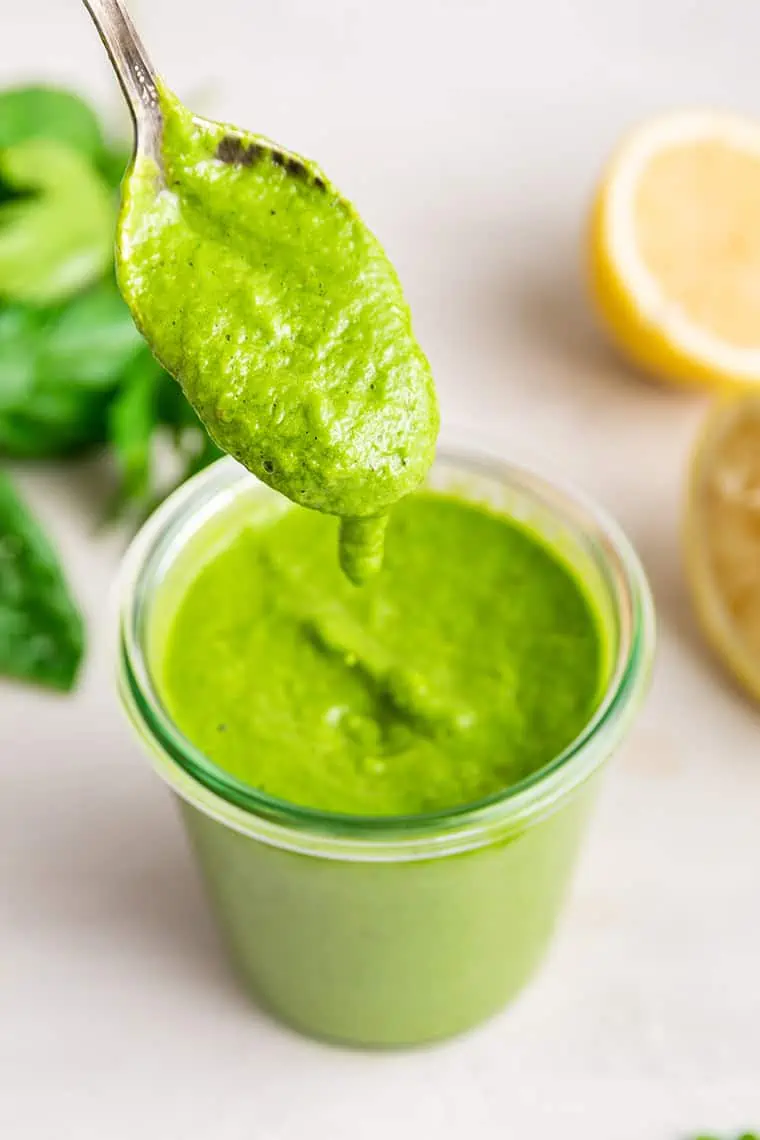
What Is Green Goddess Salad Dressing?
The original green goddess salad recipe originated in the 1920s at the Palace Hotel. The name was a tribute to George Arliss' song titled “Green Goddess.” The salad dressing is packed so many good-for-you ingredients that the name also may be a nod to the glow people get when they are eating well.
As mentioned above, traditional green goddess dressing is typically mayo-based with anchovies plus lots of herbs. My vegan version kept the herbs and the creamy texture but uses avocados and capers instead.
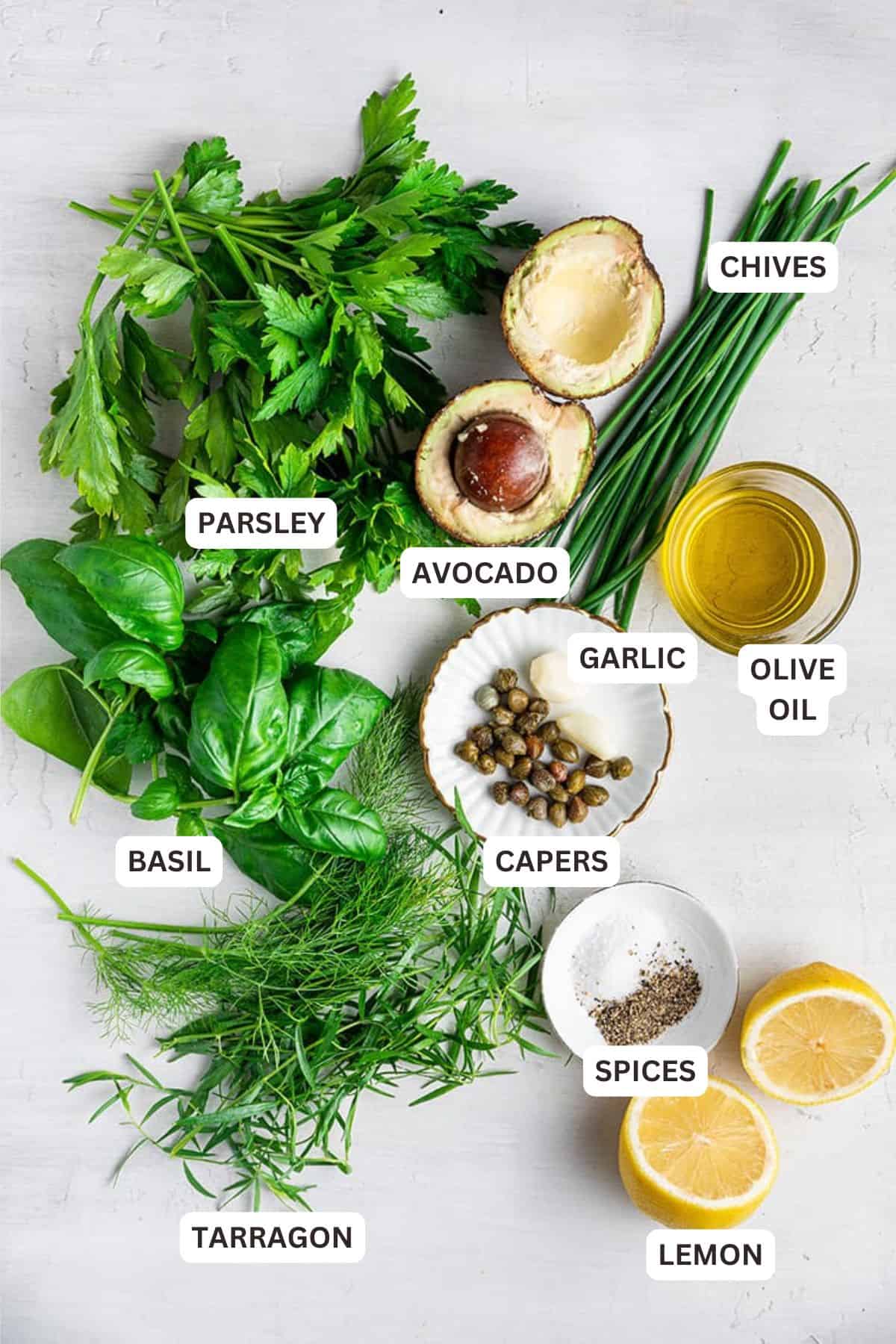
What You’ll Need
Here's a quick overview of what you'll need to make green goddess salad dressing from scratch. Be sure to scroll down to the recipe card below this post for ingredient quantities and full instructions.
- Ripe avocado – If the avocado yields to firm, gentle pressure when squeezed, you’re good to go.
- Parsley – No need to remove the leaves; you can use the stems here too.
- Mixed soft herbs – Basil, dill, and/or oregano are all great.
- Tarragon
- Chives
- Lemon – You’ll need the juice and the zest, so zest the lemon first.
- Extra-virgin olive oil
- Capers
- Garlic cloves
- Kosher salt
- Black pepper – Freshly ground is best.
What Can I Substitute for Capers?
If you can’t find capers—or if you’re just not a fan—you can substitute green olives in this dressing. Chop them to roughly the size of capers, then measure them to use in the recipe.
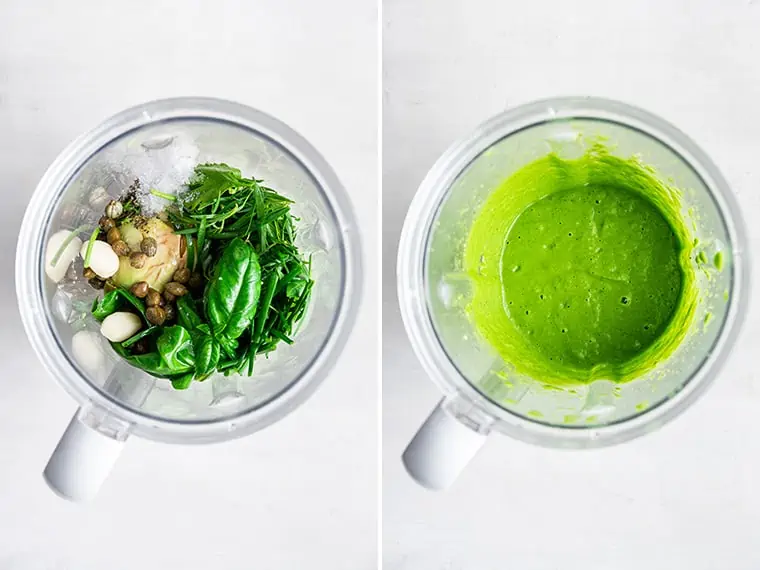
How to Make Green Goddess Salad Dressing
This vegan green goddess dressing is super easy to make—just blend everything up and you’re done! You will need to use a blender or food processor to make this recipe.
Here’s how to make it:
- Blend. Place all of the ingredients in your blender and blend until the mixture is smooth.
- Blend again. Pour 1/4 cup of water into the blender and blend again, until smooth.
- Adjust. Add more water, 1 tablespoon at a time, until the dressing reaches your desired consistency. It should be thick, but pourable. Season to taste with salt and pepper.
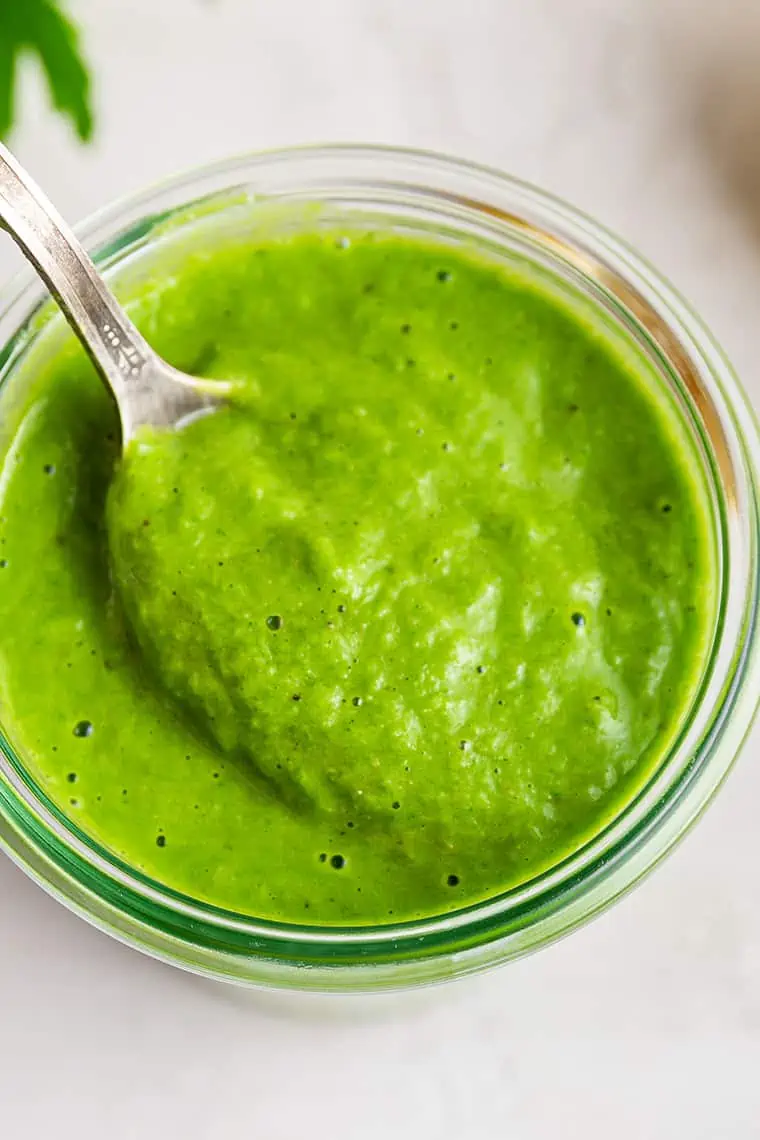
Tips for Success
- Put the liquid in first. If your blender tends to struggle with thicker consistencies, I recommend putting the lemon juice and olive oil into the blender first, then the avocado, and then everything else. This creates a vortex that pulls the rest of the ingredients in once you turn the blender on.
- Choose your herbs wisely. What’s great about green goddess dressing is that it always tastes a little bit different depending on the combination of herbs you use! Go lighter on anything with stronger, more assertive flavors like oregano.
- No blender? No problem! You can make this vegan green goddess dressing in a food processor or smoothie blender, too.
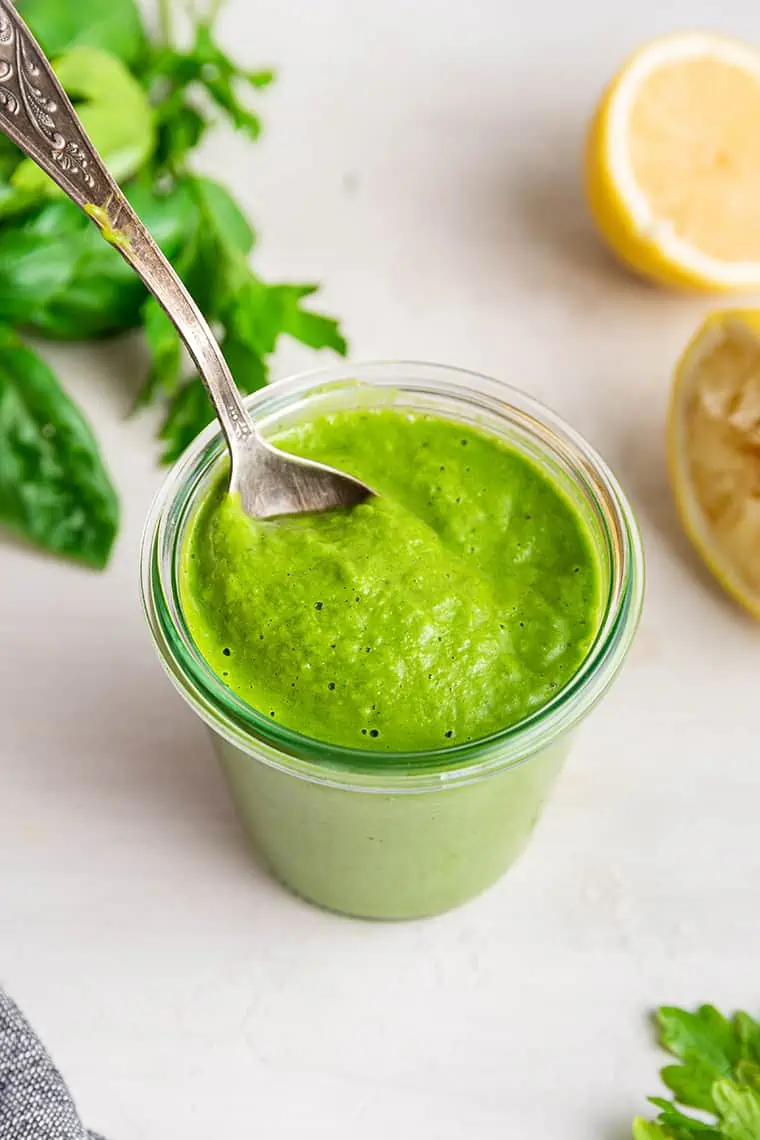
Ways To Use It
The most common way to use this dressing is to make a green goddess salad loaded up with fresh veggies. It also makes a great dip for veggies, like cucumbers, carrots, tomatoes, and peppers.
Here are some other suggestions:
- Use it for dipping roasted zucchini, crispy potatoes, falafel bites, or steamed broccoli.
- Spoon it onto baked potatoes (or stuffed sweet potatoes!) instead of sour cream.
- Toss it with zucchini noodles or even cold pasta for a simple pasta salad.
- Swap it for the dressing recipes in my Rainbow Veggie Mason Jar Salad, Spring Mix Salad With Crispy Chickpeas, or Vegetarian Kale Salad.
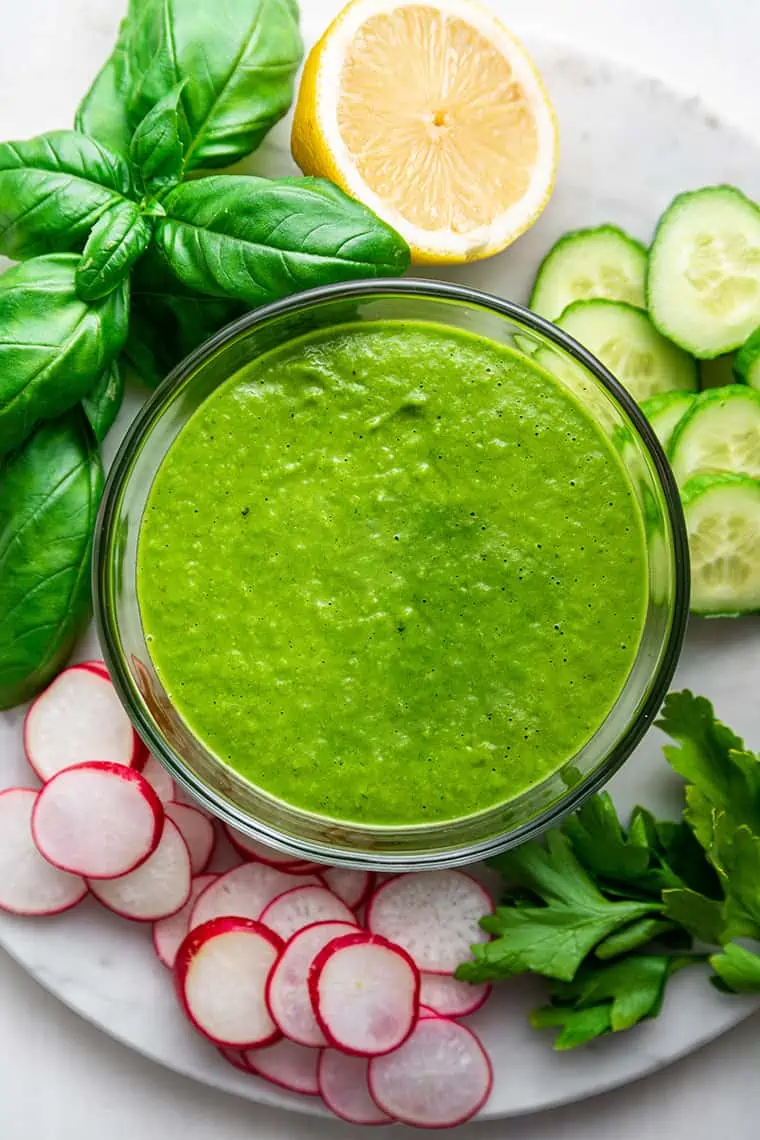
How to Store Leftovers
- Fridge. Green goddess dressing can be stored in an airtight container in the fridge for 3-4 days. The lemon juice in the recipe will slow the oxidation process, so the dressing shouldn’t turn brown during this time.
- Freezer. You can also freeze it for up to 2 months in a freezer bag or airtight storage container. Let it thaw in the refrigerator before using. Note that the color will change from bright green to a more muddy green thanks to the veggies oxidizing.
More Dressing Recipes To Try
Green Goddess Salad Dressing
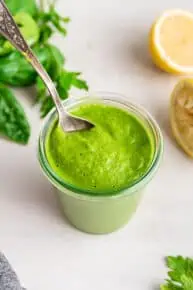
Ingredients
- 1 medium ripe avocado
- 1 cup parsley leaves and stems
- 1 cup mixed soft herbs , such as basil, dill, and/or oregano
- ¼ cup loosely packed tarragon leaves
- 2 tablespoons chopped chives
- 1 lemon , juiced
- 1 teaspoon lemon zest
- 2 tablespoons extra-virgin olive oil
- 2 teaspoons capers , drained
- 2 garlic cloves
- ½ teaspoon kosher salt , to taste
- Freshly ground black pepper , to taste
Instructions
- Place all of the dressing ingredients into a blender and blend until smooth.
- Add ¼ cup water and blend until smooth. If necessary, add more water, 1 tablespoon at a time, until you have a thick but pourable consistency.
- Adjust the seasoning to taste with salt and pepper.
